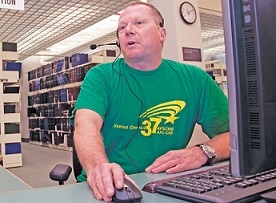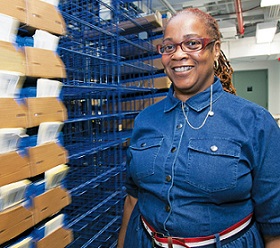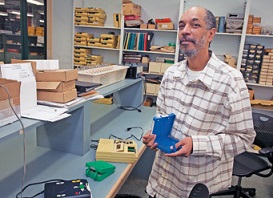Public Employee Press
Library for the Blind
Opening the world with talking books and braille
By GREGORY N. HEIRES

The Andrew Heiskell Braille and Talking Book Library, as the Library of the Blind is formally known, is in effect their neighborhood library. The only difference between them and other patrons is that they access Andrew Heiskell through the mail rather than by going to its home at 40 West 20th St. in Manhattan.
Clerical Associate Austreberto Nicot, a member of New York Public Library Guild Local 1930, maintains and mails out free digital talking book devices and four-track cassette players designed for visually-impaired people.
“The digital machines are very easy to use,” Nicot said. “For people who are not very mobile, they are a godsend.”
Tunisia Craig and Jemal Ingram, who are Collections Processing Assistant 2s, receive books and hearing devices at the loading dock on the first floor. Up to 4,000 books come in and out daily.
The library is more than 100 years old. A wealthy hat maker who became blind late in life established The New York Free Circulation Library for the Blind in 1895.

The library started out with a small braille collection. Over decades, it has moved from using the revolving cylinder of the 19th century to the 78 rpm flat platter, radio engineering and motion picture soundtrack technology, slow-speed, close-grooved records, cassettes and now audio digital machines.

About 85 percent of the library’s patrons rely on the mail to get their books.
The library has a call center run by Local 1930 members that takes book requests from visually impaired patrons. These days the workers are taking more calls because of downsizing. Staff reductions have intensified the work process and is causing morale to drop, according to Sr.
Librarian John Fahs, who is a Local 1930 shop steward and executive board member.
“The braille collection is unique,” said Fahs, who helps visually impaired patrons choose books. “We are the only braille collection in the state with open stacks. Open stack libraries for the visually impaired are pretty rare around the country.”
Noted Senior Collections Processing Associate Nina Manning, who is the secretary-treasurer of the local, “We’re proud that our work opens up the world to so many people.”


